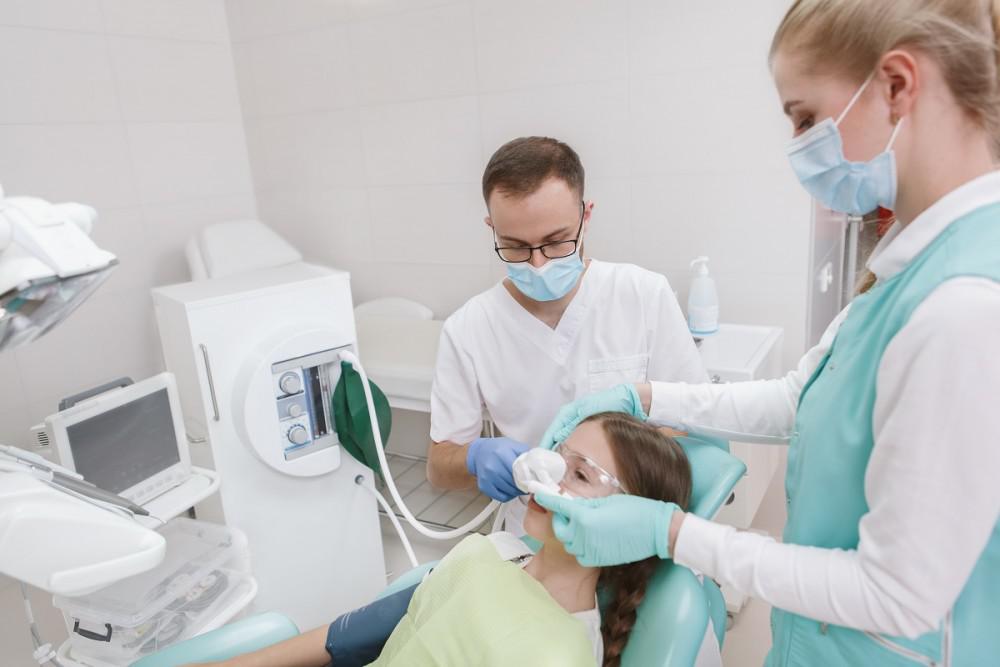
02
Nov
Pros and Cons of Sedation Dentistry

Many people are afraid of the dentist. Regular dental checkups are beneficial to your health. Skipping dental checkups has been linked to severe health issues, not just oral health. Thanks to advancements in sedation dentistry, even the most nervous patients can have their dental work completed without experiencing any distress.
Sedation dentistry aims to help patients feel comfortable enough to undergo dental procedures with minimal stress and discomfort through pharmaceuticals. There are significant pros and cons of sedation dentistry. We can help you feel more at ease by discussing sedation dentistry and answering any questions.
What is Sedation Dentistry?
Sedation dentistry makes patients comfortable throughout sedative-assisted dental operations. Moderate sedation will make you feel relaxed while awake. The patient is rendered numb to discomfort without losing consciousness; hence it’s called “twilight sleep” or “conscious sedation dentistry.”
Dentists utilize inhalation, oral, and IV sedation. Anxious dental patients may need meds. Dentists utilize inhaled, oral, or intravenous sedation to relax patients. Oral sedation involves taking tranquilizers orally. The medication is given to you to take at home before the procedure.
Sedation dentistry helps calm anxious patients so they can get the dental work they need without worrying about the discomfort they may experience. Let’s go over some of the pros and cons of sedation dentistry:
Pros of Sedation Dentistry
- Anxiety Relief
Sedation dentistry calms even our most anxious patients’ nerves. Patients can relax throughout operations, removing one reason individuals avoid the dentist. Anesthesia helps anxiety-ridden people most, but everyone can relax.
- Lower Discomfort
Muscle tightness might result from future fear. Dental sedation can help you relax and enjoy dental treatments. Low pain thresholds, gag reflexes, and sensitive teeth benefit. Relaxing can reduce dental pain.
- Anterograde Amnesia
Amnesia is greatly sought after in sedation dentistry because of its comforting effects. It may help the patient relax throughout future exams. After a hostile encounter as a child, many people acquire a dread of dentists that grows with each visit.
- Various Dental Sedation Methods
Your anxiousness and the operation will influence your sedative level. If you’re worried about overly relaxed, laughing gas is an excellent IV or oral sedation option. Highly anxious individuals should consider IV sedation. There are several ways to relax before a dental appointment.
- Dentists work faster
The dentist can work more quickly and effectively without worrying about your reaction. It helps the dentist and patient. If a patient is sedated and anesthetized, they won’t wiggle in the dentist’s chair.
Cons of Sedation Dentistry
When performed by a trained professional, sedation dentistry is a safe option for patients. There is, nevertheless, a remote possibility of difficulties. A few potential near-term dangers are:
- Drowsiness that lingers on.
- It is often challenging to anticipate how oral sedative drugs affect a patient.
- The mouth is dry (xerostomia).
- Symptoms of nausea and vomiting
- Headaches.
- Bruising from the intravenous drip
How does sedation dentistry work?
During your first appointment, you and your dentist will discuss your sedation choices. The doctor will inquire about your medical background and the supplements or drugs you’re currently using. After thoroughly evaluating your condition, they will suggest the appropriate level of sedation.
Before starting the treatment, the dentist offers you sedatives. While local anesthesia will numb your teeth and gums, your dentist will likely wait until you are relaxed after the sedatives before administering it.
Final Thoughts
There is a way to deal with dental phobia, and it involves sedation dentistry. Whether you need a routine cleaning or extensive dental surgery, dentists can give dental sedative services to make you more comfortable. You must be aware of all the pros and cons of sedation dentistry before going to the clinic, and you can also discuss it with your dentist.
Sedation dentistry is an option for patients who have anxiety or worry about seeing the dentist. It will allow them to receive the care they need to maintain healthy teeth and gums for the rest of their lives. You can get the professional dental treatment you need without letting fear stop you.
Contact your Fairfield dentist, Dr. Cheng Zhu, at Freedom Family Sedation Dentistry to know more about the Pros and Cons of Sedation Dentistry
Share this Article
 Connect with Dr. Cheng Zhu on Twitter
Connect with Dr. Cheng Zhu on Twitter
Dr. Cheng Zhu - Freedom Dental
Cheng Zhu, DMD, leads Fairfield Dental and offers safe and effective services that support optimal comfort, healing, and an exceptional patient experience.Whether you need a crown, emergency care, implants, an impacted wisdom tooth extraction, or full-mouth rehabilitation, Dr. Zhu can help. A former pharmacist who can support your oral and overall health, he is one of the few dentists licensed in California to provide intravenous sedation to ease dental anxiety.
Dr. Zhu is trained and equipped to provide many advanced surgical options, eliminating the need to refer patients to other experts. Fairfield, California, patients trust the caring, compassionate, and affordable family dental care the team offers.
